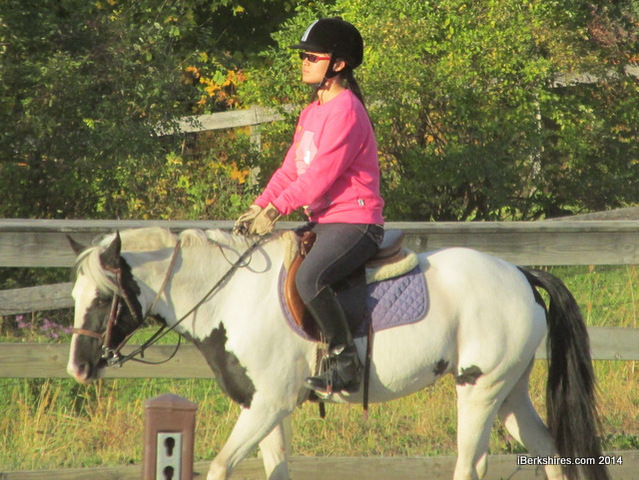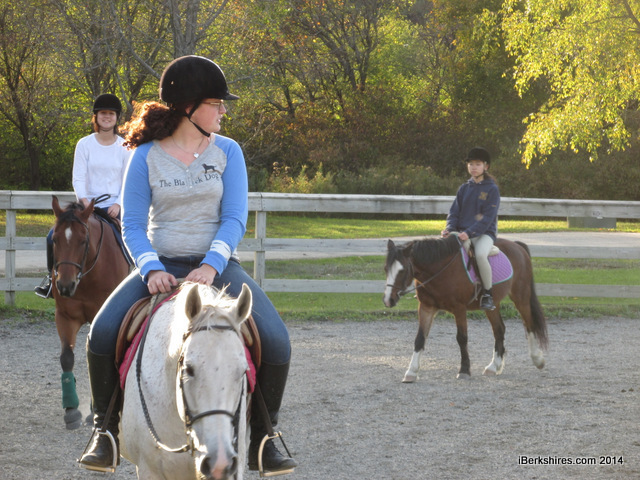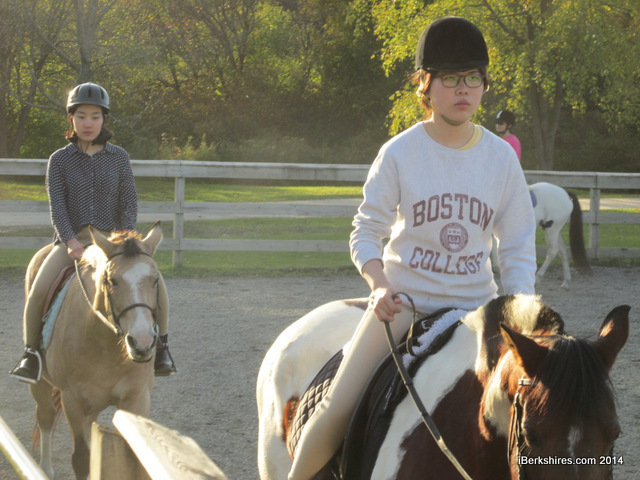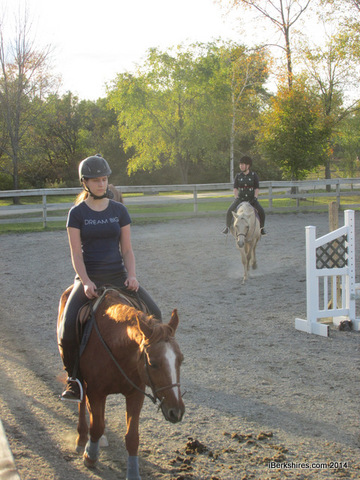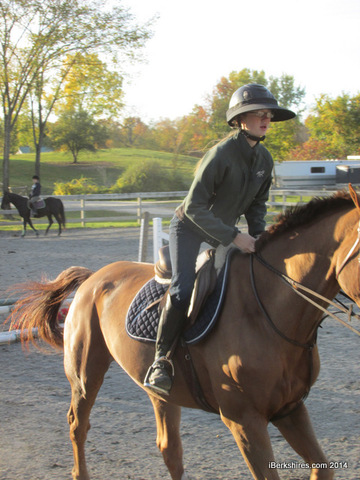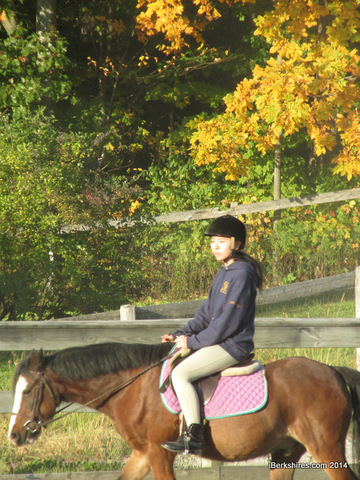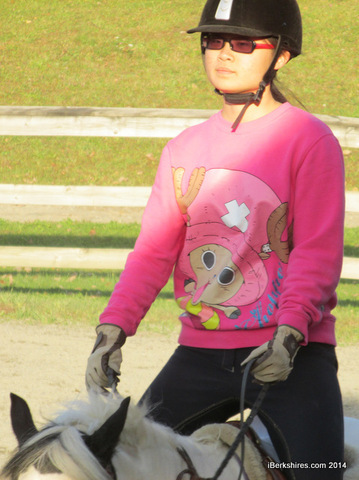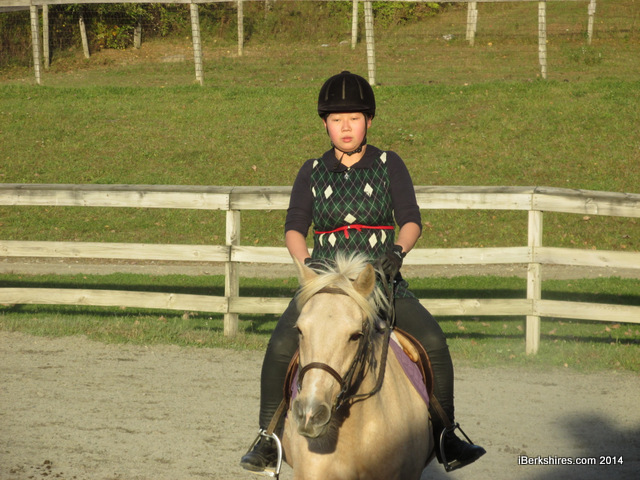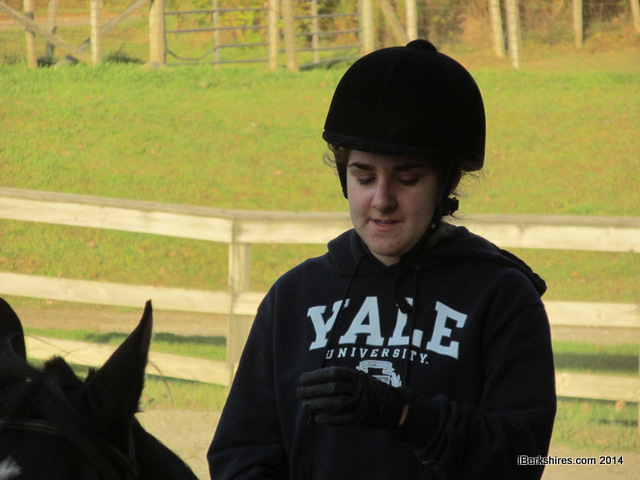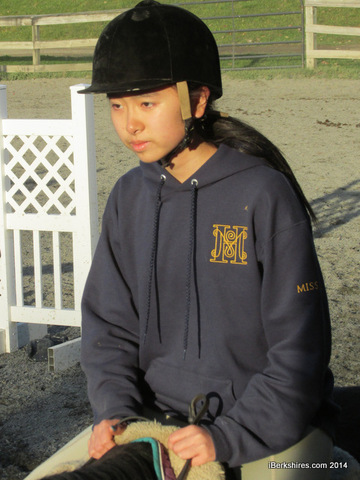Miss Hall's Students Learn About, From Horses
|
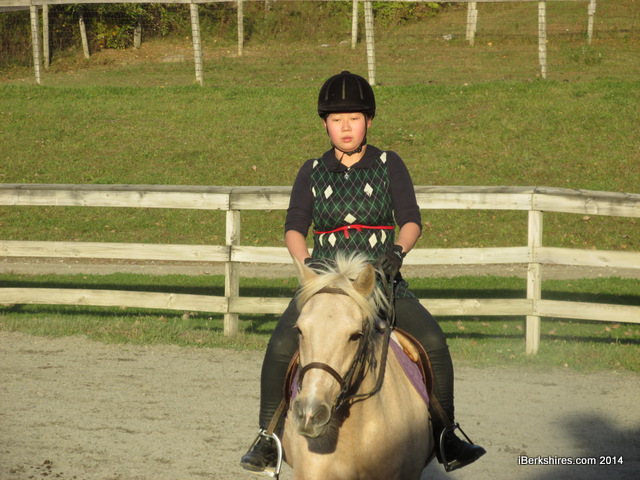
Miss Halls has partnered with White Horse Hill stable to expand their athletic offerings.
|
RICHMOND, Mass. — The newest teachers at Miss Hall's School walk on four legs and live in a barn.
But they still enjoy the occasional apple.
The prep school for girls in grades nine through 12 expanded its athletic offerings this year by adding an equestrian team through a partnership with White Horse Hill stable.
Judy Sprague is the owner of White Horse Hill and is coaching the Miss Hall's girls along with instructor Sarah Hogue.
Sprague said that horses themselves are good mentors, too, especially for the less experienced riders.
"Sometimes there is something specific I have in mind for a particular rider, so I pick out horses based on that," Sprague said, explaining how she assigns horses the four days a week that girls make the short ride on a bus driven by Debbie Horth.
"Some horses are less tolerant of certain things. Sometimes when someone is trying to learn, it's almost easier when the horse is less tolerant of the thing you're having trouble with. It's pretty motivating to change your behavior if the horse is trotting off with you when you don't want it to...
"If you're a rider who really wants to put your leg on the horse a lot, I have some horses who will just trot right off with you. They won't do anything bad, but they think you mean, 'Go,' so that's what they're going to do. So the horse is also a good teacher - not just us. We can make it so the horses are also helping the girls figure some things out."
Fifteen Miss Hall's students are taking advantage of the first-year team. The goal for this inaugural year is to get the girls some experience and get them ready for next year, when Miss Hall's hopes to compete in the Interscholastic Equestrian Association, a league that includes similar preps like Greenfield's Stoneleigh-Burnham and Simsbury, Conn.'s, Ethel Walker.
"The IEA says you have to have at least a year of formal instruction before you can compete," Sprague said. "They start with a walk/trot/canter competition. So they don't jump. And from there there are divisions all the way up to - for these guys I think it's jumps of up to 2 foot, 6 inches."
Miss Hall's athletic director Matt Ward said riding is nothing new for many of the girls at the school.
"Ever since I got here, we've had kids who rode off campus," he said. "They set it up on their own. Some received a sports credit [at the school], but it was never authorized through the school. It was similar to something like outside dance. They take classes elsewhere and earn credit for it.
"The middle of last year, one of our kids, Sara Sprague, came to me and asked about it. I looked into it, and we decided we wanted to make this work because we do have a good number of kids who are interested in it."
Sara Sprague, Judy's daughter, is a junior at the school and one of the more experienced riders on team. But unlike Sara - who was "practically born in the saddle," her mom jokes - some are very new to the sport.
"Some of these girls always wanted to to do it, but they never had the chance," Horth said. "Judy's giving them that chance in a team setting."
And Horth, whose daughter rode at Endicott College, said that riding for a team is is an important opportunity in the highly individualized sport.
"[College] was the first time that what she did rolled downhill on what the team did as a team," Horth said. "She had played soccer, but her main sport was this, and she had never experienced that feeling. She was the open rider, the top rider, and if she didn't do well, it reflected all the way down on how the team did.
"And that was a great experience for her. It freaked her out sometimes because the open riders ride at the end, and if it's a close day and the points are close, there's all that pressure. Now you're not just riding for a blue ribbon. Now you're doing well because everybody on your team is depending on you to do well, which is a whole different thing."
Twice a week, the girls receive formal lessons from the instructors, and twice a week they have "free rides," when they work on the skills they've been taught in a more casual environment.
On lesson days, the team is divided into two groups -- beginners in one and more experienced riders in the other. Even within the latter group of nine experienced riders, there still is a range of experience, but that is a benefit, Hogue said.
"They watch everyone else," she said. "As an instructor, you can tell them something, but once they see someone else performing it, it makes it easier to understand. And they aspire to do what everyone else is doing -- the beginning riders. So it kind of moves them along a little quicker."
On a recent Friday free ride, it was clear that the technique is paying dividends.
"Some of these girls have only been riding for three weeks, and you probably can't tell which," Sprague points out to a visitor during a recent Friday free ride. "You might be able to tell some are less experienced than others, but they're all able to steer and stop and post."
|
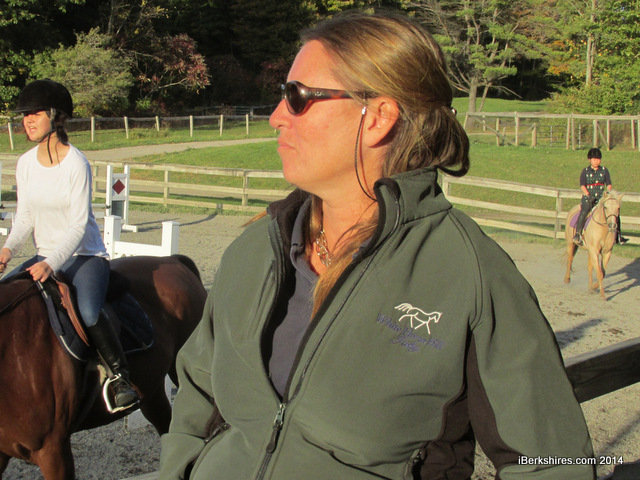
Judy Sprague of White Horse Hill in Richmond watches the riders from Miss Hall's School.
|
Participation in the IEA could open more doors for Miss Hall's graduates who want to compete at the collegiate level, Sprague said. Currently, there are 15 Division I colleges and universities who offer athletic scholarships to compete the National Collegiate Equestrian Association, but that number will soon fall to 14 with the announcement this week that Kansas State is dropping its program. The NCAA classifies equestrian as an "emerging" sport and requires at least 40 participating schools for full NCAA status.
A more common collegiate opportunity is the 47-year-old Intercollegiate Horse Show Association, which has more than 370 member schools in the United States and Canada, including colleges like Williams, Mount Holyoke, Dartmouth and Stanford.
Although those schools may not necessarily offer riding scholarships (Division III and Ivy League schools don't have athletic scholarships), equestrian experience can give a girl a leg up in the ultra-competitive admissions process.
"C.J. Law, who is the coach at Mount Holyoke, can certainly talk to admissions on someone's behalf," Sprague said.
And if you do want to ride at the IHSA level, it helps to have an experience on a wide range of horses. That's where participation on an IEA team (either through the school for Miss Hall's students or through a private stable like Williamstown's Bonnie Lea Farm) comes in handy.
"This one girl [on the Miss Hall's team] rides very well, and it's been interesting because her exposure to the sport is a little big different than what she'll be exposed to in this high school horse show environment," Sprague said. "[In the IEA and IHSA], they draw a name out of a hat, and they have to ride whatever horse whose name they draw. They've never sat on it before. They may not know anything about it. ... They walk right in the show ring and show it.
"This particular girl has had quite a lot of riding experience, but it's just been a little different for her to be here and ride a wide variety of horses. She rides them all well, but her expectations are different. We've had to talk to her about her expectations because she's going to draw a horse's name out of a hat, and it's about riding that particular animal well for what that animal is.
"I would say very few of them are what this girl is accustomed to riding."

